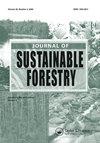The Evolution of the Dialogue and Perspectives on Sustainable Forest Management with Special Emphasis on the United States of America
IF 1.8
4区 农林科学
Q3 FORESTRY
引用次数: 1
Abstract
ABSTRACT A review covering a synopsis of the history of forest sustainability concepts and how it has led to the social, economic, and legal frameworks, criteria and indicators, and key incentive programs, which promote and influence conservation and sustainable management of forests in the United States of America is presented in two parts. The main findings show that the United States of America is a world leader in sustainable forest management, demonstrated by the fact that since the beginning of the 20th Century, forest area has been relatively stable although the population has increased, and the country remains one of the top timber producers in the world. Sustainable forest management in the United States of America is achieved in the context of private and public ownership, stakeholder collaboration, a federalist system with overarching federal laws that give freedom to state and local jurisdictions to use regulatory and voluntary means to achieve those aims, and a variety of government incentive programs offering technical assistance, financial assistance, and tax relief for landowners who proactively practice responsible forest management. This framework is reinforced through consistent enforcement of laws, monitoring, and reporting of changing conditions, and an array of future modeling to inform management actions.关于可持续森林管理的对话和观点的演变,特别强调美利坚合众国
摘要:本文分两部分综述了森林可持续性概念的发展历史,以及它是如何导致促进和影响美国森林保护和可持续管理的社会、经济和法律框架、标准和指标以及关键激励计划的。主要研究结果表明,美国在可持续森林管理方面处于世界领先地位,自20世纪初以来,森林面积一直相对稳定,尽管人口有所增加,该国仍然是世界上最大的木材生产国之一。在美利坚合众国,可持续森林管理是在公私所有制、利益相关者合作、联邦制度下实现的,联邦法律赋予州和地方司法管辖区使用监管和自愿手段实现这些目标的自由,以及各种政府激励计划,为主动实施负责任森林管理的土地所有者提供技术援助、财政援助和税收减免。通过法律的一致执行、对变化条件的监控和报告,以及为管理行动提供信息的一系列未来建模,可以加强该框架。
本文章由计算机程序翻译,如有差异,请以英文原文为准。
求助全文
约1分钟内获得全文
求助全文
来源期刊

Journal of Sustainable Forestry
Social Sciences-Geography, Planning and Development
CiteScore
3.90
自引率
12.50%
发文量
42
期刊介绍:
Journal of Sustainable Forestry publishes peer-reviewed, original research on forest science. While the emphasis is on sustainable use of forest products and services, the journal covers a wide range of topics from the underlying biology and ecology of forests to the social, economic and policy aspects of forestry. Short communications and review papers that provide a clear theoretical, conceptual or methodological contribution to the existing literature are also included in the journal.
Common topics covered in the Journal of Sustainable Forestry include:
• Ecology, management, recreation, restoration and silvicultural systems of all forest types, including urban forests
• All aspects of forest biology, including ecophysiology, entomology, pathology, genetics, tree breeding, and biotechnology
• Wood properties, forest biomass, bioenergy, and carbon sequestration
• Simulation modeling, inventory, quantitative methods, and remote sensing
• Environmental pollution, fire and climate change impacts, and adaptation and mitigation in forests
• Forest engineering, economics, human dimensions, natural resource policy, and planning
Journal of Sustainable Forestry provides an international forum for dialogue between research scientists, forest managers, economists and policy and decision makers who share the common vision of the sustainable use of natural resources.
 求助内容:
求助内容: 应助结果提醒方式:
应助结果提醒方式:


